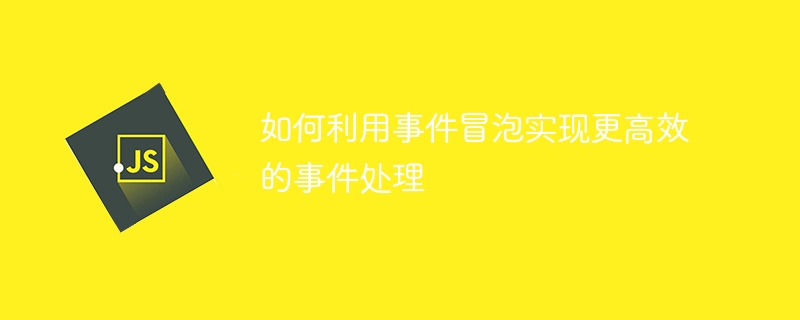Home >Web Front-end >JS Tutorial >Discussion on how to use event bubbling to improve the efficiency of event processing
Discussion on how to use event bubbling to improve the efficiency of event processing
- 王林Original
- 2024-01-13 14:07:061071browse

How to use event bubbling to achieve more efficient event processing
Event bubbling means that events are triggered starting from the most specific element, and then propagated upward to more General elements. In front-end development, correct use of event bubbling can achieve more efficient event processing. This article will introduce the principle of event bubbling, and show how to use event bubbling to achieve more efficient event processing through specific code examples.
1. The principle of event bubbling
Event bubbling is an event propagation mechanism defined in the DOM specification. When a specific event occurs on an element in the DOM tree, the event will first be triggered on the triggering element, then bubble up level by level, and finally propagate to the root node of the DOM tree.
Event bubbling has the following characteristics:
- Event bubbling is from the bottom up, that is, it propagates from the most specific element to the root node.
- During the event bubbling process, you can prevent the event from bubbling up to prevent the event from continuing to propagate upward.
- Parent elements can implement event delegation by listening to events on child elements.
2. Sample code
The following sample code demonstrates how to use event bubbling to achieve more efficient event processing.
<div id="parent">
<div id="child1">
<button id="btn1">按钮1</button>
</div>
<div id="child2">
<button id="btn2">按钮2</button>
</div>
<div id="child3">
<button id="btn3">按钮3</button>
</div>
</div>
<script>
// 监听父元素的click事件
document.getElementById('parent').addEventListener('click', function (event) {
// 获取被点击的按钮的id
var targetId = event.target.id;
// 根据id执行相应的逻辑
switch (targetId) {
case 'btn1':
console.log('按钮1被点击了');
break;
case 'btn2':
console.log('按钮2被点击了');
break;
case 'btn3':
console.log('按钮3被点击了');
break;
default:
break;
}
});
</script>In the above code, we listen to the click event on the parent element. When the button in the child element is clicked, the event will bubble up to the parent element, and then the corresponding logic will be executed by judging the id of the clicked button. In this way, we can avoid binding an event handler to each button, allowing for more efficient event handling.
3. Advantages of event delegation
Using event delegation to monitor events on the parent element can not only achieve more efficient event processing, but also have the following advantages:
- Simplify code: By using event delegation, you can reduce the number of event processing functions and simplify the code structure.
- Dynamically added elements: For dynamically added elements, you only need to add an event handler function on the parent element. There is no need to bind separate events for the newly added elements.
- Reduce memory usage: There is no need to bind event processing functions to each element, which can reduce memory usage.
4. Notes
When using event bubbling to achieve more efficient event processing, you need to pay attention to the following points:
- For those who do not need For bubbling events, you can stop event bubbling by calling
event.stopPropagation(). - If there are too many event handling functions on the parent element, performance may be affected. You can use event delegation to bind the event handler to the parent element closer to the event triggering to improve performance.
Summary:
By rationally utilizing event bubbling, we can achieve more efficient event processing. Through the analysis of code examples, we can clearly understand the principle of event bubbling and how to use event delegation to achieve more efficient event processing. At work, we should make full use of the event bubbling mechanism, optimize our event processing logic, and improve the performance and user experience of the front-end page.
The above is the detailed content of Discussion on how to use event bubbling to improve the efficiency of event processing. For more information, please follow other related articles on the PHP Chinese website!
Related articles
See more- Detailed explanation of JAVA event processing mechanism
- Detailed explanation of how to improve efficiency of compiling regular expressions in python
- 10 must-install VSCode plug-ins for efficient development
- UniApp's efficient development techniques for realizing multi-terminal adaptation
- Implementing efficient log search and filtering methods under Linux

